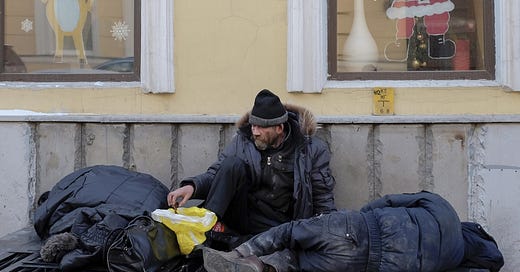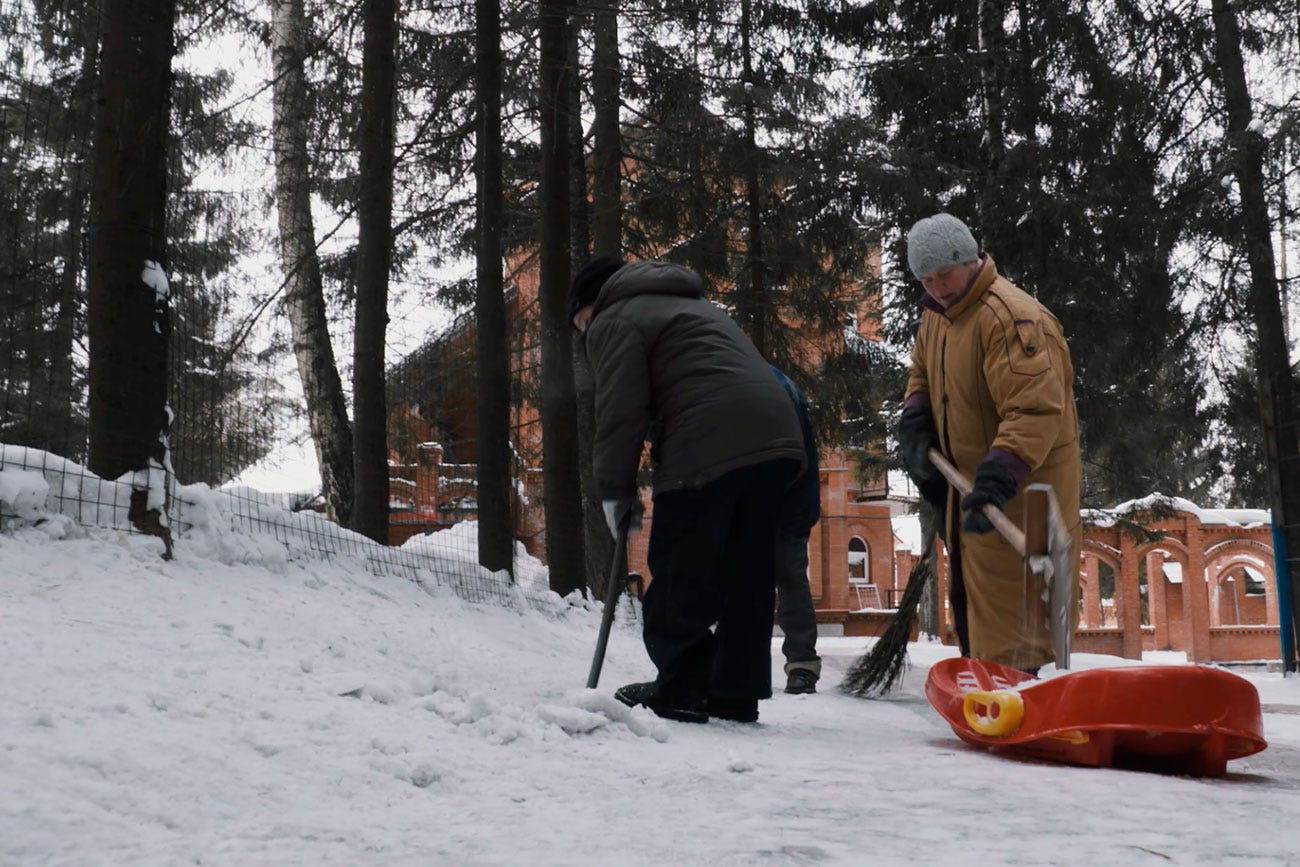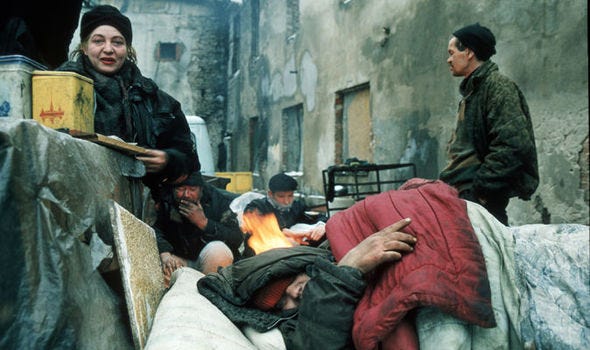I can still picture Namrud now. How we would be laughing away after sharing some anecdote, cracking jokes and how he'd haggle down the prices of shoes at the market.
I was often unkempt and careless about my appearance. But he would be very careful about keeping his shoes in sparkling polished condition. His face often beamed with a childlike joy when he came across something which enchanted him. I recall how we'd enjoy watching a Jim Carrie film “Dumb and Dumber.” Those were some of the good times. We did have some fun in the 1990's in Moscow.
Although I spent much time with him, I thought of him always as inscrutable. For instance, I knew next to nothing about his family from Ethiopia or whether they had kept in touch over the long years he had spent in Russia. He remained a mystery. One thing was certain is that for 20 years or more of his life he worked for humanitarian organisations which helped the poor and the homeless. From the early 1990's until around 2010 he worked for the then Saint Seraphim Brotherhood and then 'The Center for Humanitarian Aid.' He was the main director and was involved in the difficult feat of running a soup kitchen which fed the homeless as well as distributing clothes and offering advice to the homeless on how to get further help. This was no simple feat. It was daunting and demanding work. We all made mistakes in this work. Not everyone liked how operations were run.
There were disputes, and Namrud had his detractors. But what he actually accomplished should amaze us! If the brotherhood failed in many of its tasks it managed to arrange some people to get rooms, jobs and avoid the blind alley of taking to crime out of desperation. There were two attempts to set up a homeless newspaper which took off. It ultimately failed. But that it lasted for some time ought to count as a miracle given the lack of resources, sponsors or support.
I fondly remember many good things about Namrud. He usually came across as a very warm, cheerful and talkative person. He also turned out to be a brilliant storyteller with an inexhaustible supply of anecdotes. This comes as no startling revelation to anyone aware of Ethiopian culture. Although people associate Ethiopia with being one of the poorest countries in the world which has experienced dreadful floods, famine and droughts we should not lose sight of her deep and enduring culture.
Ethiopia is a land with a strong oral poetic tradition where storytelling is deeply rooted in their way of life. Ethiopians use stories to not only entertain people but educate and strengthen the bonds in communities. It remains a country of great priests, poets and dancers. It has a rich spiritual and cultural inheritance.
Many people were distressed to hear of Namrud's death. The wife of a priest told me “He was a very kind man. Do you know that when I was pregnant in a maternity ward he dropped in and fed us with his own Ethiopian cuisine?” I had never heard of this story before. And no doubt there are many other stories about him which I 'll never learn! I know that Namrud would often spend hours with officials asking for permission to do this or that. Not everyone understood his role.
Our Brotherhood had been allowed to operate from the premises of Peter and Paul Church which was conveniently within the vicinity of the three stations of Moscow. That is where many of the homeless first arrive from the regions and gather at night.
Helping the homeless was not straightforward. Many people were very against the homeless. They either despised them for their poverty or viewed them as criminals and a dangerous threat. Some local people in the church were against them being helped at all. We had great difficulty in persuading the church never mind the public to give us full moral support. They also sought to charge us rent for simply operating from their church even though Namrud and most volunteers were Orthodox. Namrud argued correctly it was the duty of the church to help the orphans, the poor and the widows. This is spelt out in the Bible which they chant at every liturgy.
Some people were so against us feeding the homeless they'd come and disrupt the soup kitchen. Two guys would come and rudely shut the food larder and stop us handing out soup. When I recommenced this, those two guys attempted to take me away to a police station. Despite being drunk, they were condemning the homeless as drunkards and alcoholics.
It was not just an ingrained prejudice against the homeless which we encountered. Another constant problem was that some dubious people who had volunteered for the brotherhood would try and steal some of the clothes we sought to give freely to the homeless. There were some people who came to us who had no idea about volunteering. They sought money for their efforts.
One leading person who was helping us wanted to run the charity as a kind of semi-business. They strived to take advantage of the fact that charities were not obliged to pay taxation. The abuse of charity was so bad the Orthdox church in Moscow closed down many Brotherhoods and refused to bless them.
One terrible problem which Namrud encountered was racism. He told me and Jim Vail how unpleasant it could be. When Namrud once told an official that his job was to help the homeless in Moscow, she got very offended. She just couldn't understand his role. She asked him, “What is an Ethiopian man doing feeding people in Moscow when you have your own people to feed?” They were used to Ethiopia being a satellite state where their people were under the Soviet thumb rather than vice versa.
Our brotherhood got a lot of media coverage. But this was often double-edged, unfortunately. One article in a Russian newspaper which was otherwise well written had the racist title 'N*gger feeds the Homeless in Moscow.' After this article was published by a tabloid paper some people recognized Namrud on the streets. I recall seeing unpleasant people shouting at him “Hi, n*gger, feed me a banana.” Namrud was worried he might even be physically attacked on the streets. Institutional racism has never been concealed here. Just visit the metro and you'll see that the police more often stop a person from the Caucasus, China or anyone with an Asian appearance. They are more likely to be stopped and detained than local Russians. The police regularly raid and harass foreign students who stay at the hostels of universities in Moscow.
Despite this ugly racism I think most Russians don't make unpleasant racist remarks to Africans and have even got used to their presence in Moscow. One day, Namrud came to his student hostel only to find himself locked out of his room. The security men refused to let him into the student hostel. The authorities had given him no notice. Of course, I noticed that Namrud had been staying at this hostel for over 10 years. I concluded that he must by then be working on his doctorate. I was astonished to learn that he had not even finished his diploma in Economics. In Scotland, it usually takes a maximum of 4 years to finish an honours degree. Here he had not got around to finishing it after 10 years. Was he intentionally prolonging it because he could not afford to rent a flat in Moscow? That was my conclusion.
Tragically, Namrud fell victim to alcoholism and developed sclerosis. He was often admitted to hospitals but saved by highly skilled surgeons. Although we found him a place to stay in a charity which looked after the homeless, this charity was afraid he would die in the shelter and that they would be held to blame for his death. So they agreed to pay for his ticket back to Ethiopia if he agreed to get an exit visa. I don't think this was a fair decision. It never occurred to some people that he did not want to return to Ethiopia. He had got used to living here. His heart was in Russia and not Ethiopia.
Soon after he returned to his country, he died in a hospital there. But I have to say that right to the end even when he was sick he was helping the homeless. Seeing a homeless person desperately looking for cigarette butts to smoke in the toilet he asked me to bring in some packets of cigarettes for the poor guy. When we visited him in hospital he would talk about how to help the homeless more effectively. Jim Vail had to regretfully inform him that he had to prioritise his own health because he was really 'at death's door.'
When I last spoke to him while he was waiting at the airport to board a plane back to Ethiopia he asked me to continue working to help the homeless. I asked him how he felt about returning to Ethiopia. He told me he was in two minds. But you could feel the anguish in his sad and somber voice. I wondered if leaving Russia had broken his very soul.
Despite his short and tragic life, his legacy as a fighter for the homeless lives on. His daughter who lives in Canada is also helping the downtrodden. This should be a consolation to Namrud—who lives in the next world.
We are honored to have met and worked with him. We won't forget him !





